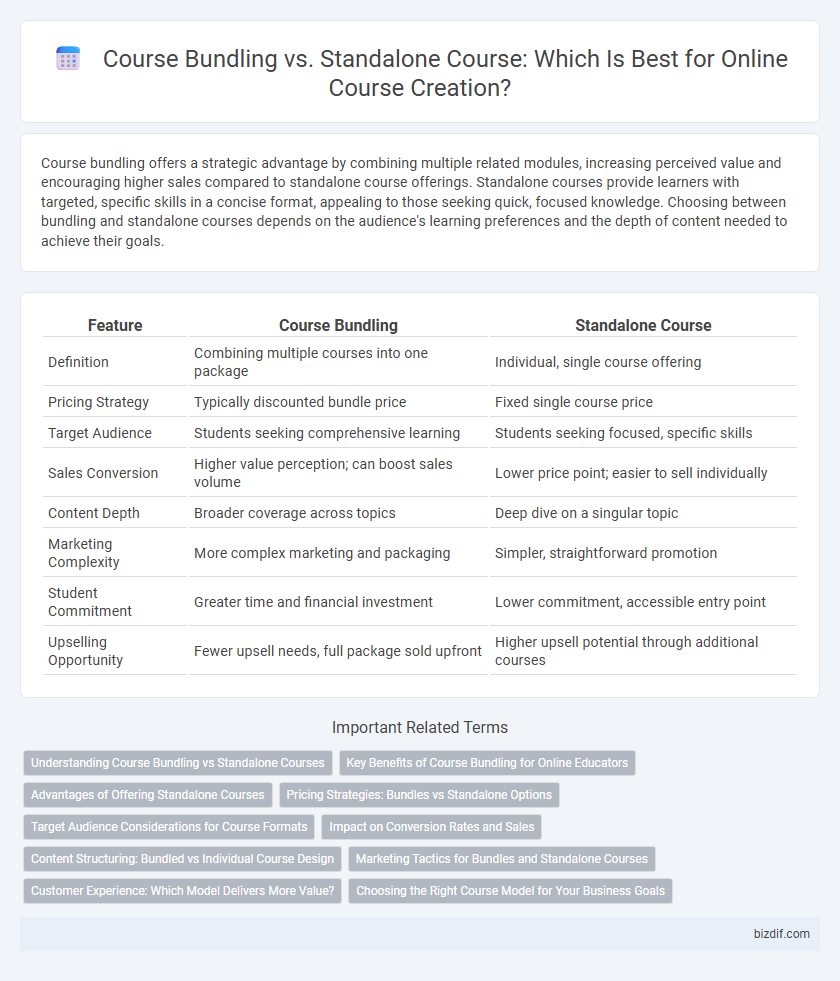Course bundling offers a strategic advantage by combining multiple related modules, increasing perceived value and encouraging higher sales compared to standalone course offerings. Standalone courses provide learners with targeted, specific skills in a concise format, appealing to those seeking quick, focused knowledge. Choosing between bundling and standalone courses depends on the audience's learning preferences and the depth of content needed to achieve their goals.
Table of Comparison
| Feature | Course Bundling | Standalone Course |
|---|---|---|
| Definition | Combining multiple courses into one package | Individual, single course offering |
| Pricing Strategy | Typically discounted bundle price | Fixed single course price |
| Target Audience | Students seeking comprehensive learning | Students seeking focused, specific skills |
| Sales Conversion | Higher value perception; can boost sales volume | Lower price point; easier to sell individually |
| Content Depth | Broader coverage across topics | Deep dive on a singular topic |
| Marketing Complexity | More complex marketing and packaging | Simpler, straightforward promotion |
| Student Commitment | Greater time and financial investment | Lower commitment, accessible entry point |
| Upselling Opportunity | Fewer upsell needs, full package sold upfront | Higher upsell potential through additional courses |
Understanding Course Bundling vs Standalone Courses
Course bundling combines multiple related courses into a single package, offering learners comprehensive content and potentially higher value at a discounted price. Standalone courses focus on one specific topic, providing targeted, in-depth expertise without additional modules. Understanding the differences helps creators tailor their offerings to meet learner needs, optimize pricing, and increase overall course sales strategy.
Key Benefits of Course Bundling for Online Educators
Course bundling enhances value by offering multiple related courses as a cohesive package, increasing average order value and boosting revenue for online educators. Bundles improve student engagement and satisfaction through comprehensive learning paths that address various skill levels and topics. Offering bundled courses also simplifies marketing efforts and encourages higher enrollment rates by providing a clear, attractive proposition to prospective learners.
Advantages of Offering Standalone Courses
Standalone courses offer focused learning experiences tailored to specific skills or topics, attracting learners seeking quick, targeted knowledge acquisition. These courses enable flexible pricing strategies and easier marketing by clearly defining the value proposition for niche audiences. Learners benefit from reduced commitment, making standalone courses an ideal choice for busy professionals and beginners looking to build expertise step-by-step.
Pricing Strategies: Bundles vs Standalone Options
Pricing strategies for online course creation vary significantly between course bundling and standalone courses. Bundled courses often provide higher perceived value, enabling creators to offer a discounted price per course, which can attract more students seeking comprehensive learning paths. Standalone courses, priced individually, allow for targeted marketing and flexibility, often appealing to learners interested in specific skills without committing to a larger investment.
Target Audience Considerations for Course Formats
Course bundling appeals to learners seeking comprehensive skill sets by offering multiple related courses at a discounted rate, ideal for professionals aiming to deepen expertise or transition careers. Standalone courses target individuals with specific learning objectives or limited time, providing focused content for immediate application. Understanding the target audience's goals, time availability, and budget constraints is crucial for selecting the optimal course format.
Impact on Conversion Rates and Sales
Course bundling significantly boosts conversion rates by offering increased perceived value, leading to higher average order values and improved customer retention. Standalone courses appeal to niche learners seeking specific skills, resulting in higher conversion rates for targeted topics but lower overall sales volume compared to bundles. Data shows that course bundles can increase sales by up to 30%, making them a strategic choice for maximizing revenue in online course platforms.
Content Structuring: Bundled vs Individual Course Design
Course bundling allows for strategic content structuring by grouping related modules into cohesive themes, enhancing learner engagement through a comprehensive learning path. Standalone courses emphasize focused, in-depth coverage of specific topics, enabling targeted skill acquisition without distraction. Optimizing course design requires balancing the breadth of bundled content with the depth of individual courses to meet diverse learner needs and maximize educational outcomes.
Marketing Tactics for Bundles and Standalone Courses
Course bundling increases perceived value by offering complementary topics, encouraging higher average order values through package deals promoted via targeted email campaigns and limited-time discounts. Standalone courses benefit from focused marketing strategies that highlight individual course outcomes and leverage niche-specific paid ads to attract highly qualified leads. Utilizing course bundles for upselling and cross-selling expands customer lifetime value, while standalone courses drive conversions through clear, outcome-driven messaging and social proof.
Customer Experience: Which Model Delivers More Value?
Course bundling enhances customer experience by offering a comprehensive learning path, increasing perceived value through diverse, interconnected content that addresses multiple skills or topics. Standalone courses appeal to learners seeking focused, bite-sized knowledge, providing flexibility and quick skill acquisition without overwhelming commitment. Bundling often results in higher engagement and retention rates due to the holistic approach, while standalone courses maximize convenience and targeted learning efficiency.
Choosing the Right Course Model for Your Business Goals
Choosing between course bundling and standalone courses depends on your business goals and target audience preferences. Course bundles offer increased perceived value and higher sales potential by combining related topics, enhancing customer satisfaction through comprehensive learning paths. Standalone courses allow for focused, in-depth content delivery and easier marketing but may limit cross-selling opportunities and overall revenue growth.
Course bundling vs Standalone course Infographic

 bizdif.com
bizdif.com